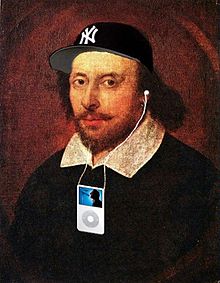Hi all,
As we know, the exams are approaching fast! I’ve created a short video which analyses Plath’s ‘Arrival of the Bee Box’ poem.
Enjoy!
Ms G
Hi all,
As we know, the exams are approaching fast! I’ve created a short video which analyses Plath’s ‘Arrival of the Bee Box’ poem.
Enjoy!
Ms G

Over the past couple of years, I have been hearing the cries of dissatisfaction when it comes to learning about Shakespeare. “Why should we study Shakespeare?” is the most asked question in a classroom. Students find it outdated, irrelevant and very difficult to relate to. Of course many parents and certainly teachers disagree.
People are aware of the fact that William Shakespeare invented a lot of new words. Not one soul, however knows the exact number of the conceived words but it is estimated that approximately 1700 up to 10000 were invented by Shakespeare (or perhaps he was the first to use them). Some of the most everyday phrases that we use have derived from his plays. Here is a very short list of the most common phrases that we use:
1. “Vanished into thin air” (The Tempest 1610-11) most commonly used when something/someone disappears without a trace.
2. “It’s Greek to me” (Julius Caesar 1599) used when someone doesn’t understand what another is saying.
3. “Slept not one wink” (Cymbeline -date unknown) used when someone had a sleepless night.
4. “Too much of a good thing” (As You Like It 1599) normally used when someone had too much of a certain thing that they enjoyed the most until it lost its value and thus became unpleasant.
5. “A laughing stock” (The Merry Wives of Windsor 1600) being the center of a joke/being laughed at for something that they have done or said.
6. “Break the ice” (Taming of the Shrew 1594) used when one doesn’t know the other person and thus has to ask questions to find out more about him/her.
7. “In a pickle” (The Tempest 1610-11) this phrase is used when someone finds themselves to be in a tough situation.
If we stop reading Shakespeare then the meaning of such phrases will become unclear for the future generations and eventually they would not be used anymore. This would create a vicious circle resulting in pupils finding his work even more difficult.
Shakespeare not only invented new phrases and new words but he also added depth to the language. In Modern English ‘you’ can be plural and singular. However, Shakespeare added layers of meaning to the way he used thou, ye and you. Let’s define the different meanings of these personal pronouns.
Thou/thee- commonly used when addressing one person in a formal manner (normally used to show affection).
Ye- was used when addressing more than one person at a time (Irish still continue to use this!) This would also be considered quite formal.
You- was used by people who were considered to be of lower rank/status e.g. used by children to a parent.
By defining personal pronouns in such a way, Shakespeare was able to show respect, affection, level of education, intelligence etc. in his plays and sonnets. This certainly shows his brilliance!
Shakespeare’s plays are certainly not outdated as some pupils have suggested. A lot of themes that are used in his plays do apply to our lives. Some of the themes that are used in Shakespeare’s plays are also presented in some of the best films of all time: love (The Notebook), family (Charlie and the Chocolate Factory/Frozen), conflict (Mean Girls), corruption (The Godfather), order and disorder (The Departed), superstition (The Village) etc.
Most certainly children do need to study it, read it, watch it and act it out. Shakespeare’s plays should be brought to life in the classroom and beyond it! Which other author has shaped and standardized our language as much as Shakespeare? Only by immersing children into the life of Shakespeare and by relating it to today’s world (events, films, languages etc.) can we expect it to be loved.
I do hope that you agree with me and that you have learnt something new today 🙂
Regards,
ggontyte

We all know that an extensive vocabulary has many pros (e.g. improves your confidence, superior interview skills, better grades in school, communication skills and you can even impress someone with how well spoken you are!) however, little of us know where to go and look for words that would be useful for us, because we all know that there’s nothing worse than learning something that you are never going to use! So, I’ve compiled a small list of words that I use very often and I feel that students/pupils should consider them in verbal and written communications.
1. Obstreperous– (adjective) meaning difficult or unruly
e.g. The boy was loud and obstreperous.
2. Endeavor- (verb) meaning an attempt/aim e.g. Teachers endeavor to make students happy.
Also a (noun) meaning to try e.g. An endeavor to achieve good grades.
3. Superfluous (adjective) meaning more than enough/surplus
e.g. “You need to clear off all of the superfluous items on your table.”
4. Camaraderie– (noun) meaning brotherhood/sisterhood/friendship
e.g. Enjoy the camaraderie of the people that you study with.
5. Credulous – (adjective) meaning naive/trusting
e.g. Little Red Riding Hood was a credulous girl.
6. Inconspicuous- (adjective) meaning something that is hidden/unnoticeable
e.g. Supermodels wear inconspicuous make-up.
7. Brusque– (adjective) meaning curt/abrupt
e.g. Miss Gontyte could be impatient and brusque. (not really!) 🙂
8. Eponymous– (adjective) meaning giving their name to something/named after a particular person
e.g. The eponymous hero of Harry Potter.
9. Stupefied- (verb) meaning shocked/unable to think clearly/amazed
e.g. Stupefied passengers were unable to move.
10. Tangible- (adjective) meaning something definite/real e.g. No tangible grounds for my hypothesis.
(noun) meaning something that you can touch or something that is solid e.g. Tangible assets.
I hope that you learnt some new words today! If you found this stimulating or simply interesting then do not forget to leave a comment.
Regards,
ggontyte